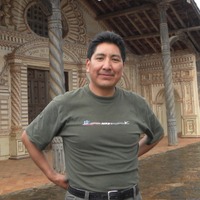
Victor Maqque
I am a native Quechua from the southern highlands of Peru. Macusani, my hometown located at 15,000 feet above sea level (4,500 m a.s.l.), is the world capital of the South American Camelids, alpaca, llama, wanaco, and the elusive vicuña.I earned my B.A. in sociology and a M.A. in Social Sciences in the Universidad Nacional del Altiplano, Puno, Perú. at the UNA, Puno I had the honor to teach, found and direct a faith based higher education institute focused on social, ethics, and justice concerns. Along with many colleagues and young professionals I also founded and directed the Instituto Andino de Ciencia y Etica (INACET).I moved to the University of Notre Dame in Indiana, USA in order to obtain a M.A. and a PhD. in History of Latin America. At Notre Dame I had the great privilege to instruct, and guide many extraordinary undergrad and graduate students studying Latin America. With the support of the Kellogg Institute for International Studies I developed and instructed the Quechua Language and Culture Program.At Purdue University, I was the Tecumseh PostDoctoral Fellow in the Department of History and the Native American Educational Center at Purdue University. At Purdue, I had also the pleasure to see the launching of the Quechua language program under the Indigenous and Endangered Languages Lab (IELLab), as well as participate in Indigenous languages, cultures, and literatures in the NAECC. Currently, at Purdue's C4E, I am the Research Program Manager at the Arequipa Nexus Institute that is the product of a large multi-year research collaboration between Purdue and the Universidad Nacional de San Agustin (UNSA) of Arequipa, Peru
Phone: (574)252-1453
Address: 1961 Indian Trail Dr.
West Lafayette, IN 47906
Phone: (574)252-1453
Address: 1961 Indian Trail Dr.
West Lafayette, IN 47906
less
Uploads
Papers by Victor Maqque
The late-colonial Andes had been mostly known for the Bourbon Reforms, the massive “Age of Andean insurrections,” and the effects of the bloody colonial repression. The defeat of the insurrections and the concurrent erasure of the cacique figures had been mostly perceived as the triumph of the colonial power and the decapitation of the Andean societies. In this essay I demonstrate that it was the collective political participation of the communities the fundamental factor for the erosion and eventual elimination of the caciques. Thus, rather than being decapitated, the communities themselves carried out a remarkable transformation of their political culture from below. This process shows the formation of the basis of these communities’ political culture and explains, in part, their survival and their active participation during the independence wars and subsequent history of the region.
Key words: Indigenous communities, caciques, political culture, politics from below.
Books by Victor Maqque
Andes, left her extraordinary library to the Instituto Pastoral
Andina (IPA) in Perú. Professor MacCormack was recognized
by her exemplary scholarship, her books, and numerous articles
examining the complex history of colonial Andes. Her trajectory
from Germany to England, and then to the United States
was as significant as the scope of her studies from the classic
Greco-Roman to the Andean world. Her colleagues and friends
on mourning her tragic death reflected on the importance of
a comprehensive intellectual inquiry into the seemingly detached
societies that MacCormack studied. The contributions of
MacCormack, however, continue thriving on the number of
followers of her studies and her carefully collected and curated
library that is now located in Peru
The late-colonial Andes had been mostly known for the Bourbon Reforms, the massive “Age of Andean insurrections,” and the effects of the bloody colonial repression. The defeat of the insurrections and the concurrent erasure of the cacique figures had been mostly perceived as the triumph of the colonial power and the decapitation of the Andean societies. In this essay I demonstrate that it was the collective political participation of the communities the fundamental factor for the erosion and eventual elimination of the caciques. Thus, rather than being decapitated, the communities themselves carried out a remarkable transformation of their political culture from below. This process shows the formation of the basis of these communities’ political culture and explains, in part, their survival and their active participation during the independence wars and subsequent history of the region.
Key words: Indigenous communities, caciques, political culture, politics from below.
Andes, left her extraordinary library to the Instituto Pastoral
Andina (IPA) in Perú. Professor MacCormack was recognized
by her exemplary scholarship, her books, and numerous articles
examining the complex history of colonial Andes. Her trajectory
from Germany to England, and then to the United States
was as significant as the scope of her studies from the classic
Greco-Roman to the Andean world. Her colleagues and friends
on mourning her tragic death reflected on the importance of
a comprehensive intellectual inquiry into the seemingly detached
societies that MacCormack studied. The contributions of
MacCormack, however, continue thriving on the number of
followers of her studies and her carefully collected and curated
library that is now located in Peru